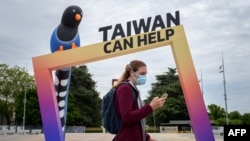The United States and several allies issued a joint statement Friday voicing support for Taiwan to take part in the World Health Organization’s World Health Assembly, which formally opens Monday in Geneva.
The World Health Assembly, or WHA, is an annual gathering in which member nations and states meet with health experts from around the world to discuss priorities for advancing global health and global health security.
Taiwan is excluded from most international organizations because of objections by China, which considers the democratically governed island its territory.
Delegates from Taiwan attended the World Health Assembly as nonvoting observers from 2009 to 2016, during a period of relatively warm ties between Beijing and Taipei.
The Beijing government has been blocking Taiwan's representation at WHO meetings since the self-ruled democracy elected Tsai Ing-wen, a China skeptic, as Taiwan’s president in 2016 and won the reelection in 2020.
Tsai rejects the Beijing government’s condition that both sides belong under one flag. The two sides have been separately ruled since the 1940s.
The joint statement by the United States, Australia, Britain, Canada, the Czech Republic, Germany and Japan, and signatories said Taiwan’s participation in the assembly best exemplifies the WHO’s “health for all” approach to international health cooperation.
The statement said the COVID-19 pandemic plainly illustrated “viruses do not respect borders and it takes global cooperation to keep the whole world safe."
U.S. Secretary of State Antony Blinken earlier this month issued a separate statement strongly encouraging “the WHO to reinstate an invitation to Taiwan to participate as an observer at this year’s WHA so the world may once again benefit from Taiwan’s expertise and experience.”
Blinken’s and other calls for Taiwan’s WHA participation prompted China’s Foreign Ministry last week to issue a statement reiterating its position.
At a Beijing briefing, Foreign Affairs Ministry spokesman Wang Wenbin told reporters, "Since the Democratic Progressive Party came to power in 2016, it has refused to recognize the 1992 consensus and stubbornly stuck to the 'Taiwan independence' separatist position,” he said. “Which means that the political foundation for the Taiwan region's participation in the WHA no longer exists."
The 1992 consensus holds that Taiwan and mainland China are parts of “one China,” with different interpretations of what “China” means.
Beijing interprets it as the People's Republic of China. Taipei interprets it as the Republic of China, Taiwan’s formal name.
At a news conference Friday in Taipei, Taiwan Health Minister Chiu Tai-yuan and Foreign Minister Lin Chia-Ling said a delegation would travel to Geneva for meetings on the sidelines of the WHA with friendly countries.
Some information for this report was provided by Reuters and Agence France-Presse.





